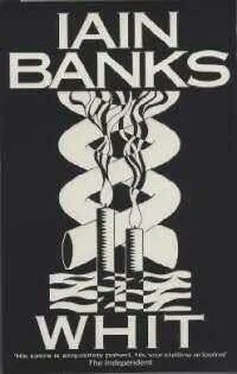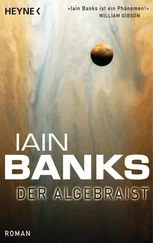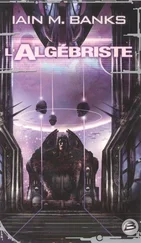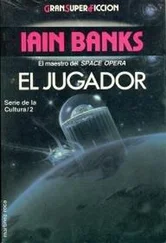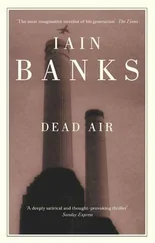'Royal Scotland, I suppose.'
I felt like one of two people rowing a boat, only my partner wasn't actually rowing, just stirring their oar in the water, so that we kept going round and round in circles.
'Where did you find the bag, Great-aunt?' I asked, flatly.
'On the-' she began, then sat forward and beckoned to me. I leaned towards her so that her mouth was at my ear. 'I forgot,' she whispered.
'Forgot what, Great-aunt?'
'We don't have it any more. We burned it. Saw what would happen and thought we'd get rid of it. I'm sorry.'
'But where did you get the bag, Great-aunt? You said-'
'From the chest.'
'The chest?'
'Our special chest. The one he didn't have a key to. That's where we kept it. And the book.'
'The book?' Here, I thought, we go again. But no:
'I'll show you. I still have a box, you know. The chest we lost in the fire, but I saved the book and the other things!' She clutched excitedly at my shoulder.
'Well done!' I whispered.
'Thank you! Would you like to see it?'
'Yes, please.'
'It's in the wardrobe. You get it for me, there's a good girl.'
I was directed to the full wardrobe, which was stuffed with colourful saris and other, plainer clothes. At its foot, amongst a litter of old shoes and fragrant white mothballs, there was a battered shoe-box secured with a couple of dark brown elastic bands. The box felt quite light when I lifted it and brought it over to Zhobelia, who seemed quite animated at the thought of what was inside. She bounced up and down on the bed and motioned me to bring her the box, for all the world like a child waiting on a present.
She pulled the elastic bands off the old shoe-box; one band snapped, seemingly just of old age. She put the lid of the box down on the bed beside her and started sorting through the documents, newspaper cuttings, old photographs, notebooks and other papers inside.
She handed me the old photographs. 'Here,' she said. 'The names are on the back.'
She shuffled through the other stuff in the box, stopping to read occasionally while I looked at the old snaps. Here were the two sisters, looking young, wary and uncertain in front of their old ex-library van. Here they were with Mr McIlone, whom I recognised from the few other photographs that we had at High Easter Offerance. Here was the farm at Luskentyre, here the old seaweed factory, before and after renovation, and before and after the fire.
There was only one photograph of Grandfather, sitting in bright sunlight on a kitchen chair outside what I guessed was Luskentyre, turning his head away and putting his arm up to his face in an action the camera had captured as a blur. It was the only representation I had ever seen of him, apart from a couple of even more blurred newspaper photographs. He was barely recognisable, but looked very thin and young.
'Ah. Here now…' Zhobelia lifted a small brown book - about the size of a pocket diary, but much thinner - from the shoe-box. She looked inside the little book, taking off her glasses to read. A piece of white paper fell out. She picked it up and handed it to me.
I put the photograph of my Grandfather down on the knee of my leather trousers. 'Ah-ha,' she said matter-of-factly.
I unfolded the piece of paper. It felt crinkly and old, but also thick and fibrous. It was a bank-note. A ten-pound note, from the Royal Scottish Linen Bank. It was dated July 1948.1 inspected it, turned it over, smelled it. Musty.
Zhobelia tapped my knee again. Having attracted my attention, she gave me a stagy wink as she handed me the small brown book.
I put the bank-note on my knee along with the photograph of Grandfather.
The little brown book looked faded and worn and very old. It was warped, too, as though it had once been saturated with water. There was a British Royal Crown on the front cover. It was really just two bits of card, one thinner piece placed inside the other thicker cover, and not secured. The inner card carried a list of dates and amounts of money, expressed in pounds, shillings and pence. The last date was in August 1948. That piece of card was marked AB 64 part two. I put it down on the bed cover. The other piece of card was marked AB 64 part one. It seemed to be some sort of pass book. It belonged, or had belonged, to somebody called Black, Moray, rank: private. Serial number 954024. He was five feet ten inches tall, weighed eleven stone five pounds and had dark brown hair. No distinguishing marks. Born 29.2.20.
The rest was a description of injections he had received and what sounded like army punishments: fines, detentions and losses of leave. Perhaps it was just tiredness that meant I didn't haul up short at the date of birth, for I found myself thinking that I had no idea what any of this had to do with anything, until I looked from the book to the photograph of my Grandfather as a young man, still on my knee.
The world tipped again, my head swam. I felt faint, dizzy and sick. A terrible shiver ran through me as my palms pricked with sweat and my mouth went dry. My God. Could it be? Height, weight; hair colour. Of course the scar wouldn't be there… And the birth-date, to settle it.
I looked up into the eyes of my great-aunt. I had to attempt to swallow several times before I had enough saliva in my mouth to make it possible to speak. My hands started shaking. I rested them on my thighs as I asked Zhobelia, 'Is this him?' I held up the small brown book. 'Is this my Grandfather?'
'I don't know, my dear. We found that in his jacket. The money was on the beach. Aasni found it.'
'The money?' I croaked.
'The money,' Zhobelia said. 'In the canvas bag. We counted it, you know.'
'You counted it.'
'Oh yes; there were twenty-nine hundred pounds.' She gave a sigh. 'But it's all gone now, of course.' She looked at the ten-pound note sitting on my knee. 'We burned all the rest, in the canvas bag.' She nodded at the white ten-pound note resting on my leg. 'That's the last one left.'
I sat with my great-aunt, gradually piecing together the story, going over it from what seemed like slightly different angles in her memory. The story of my Grandfather being found on the sandy ground outside the mobile shop at Luskentyre on the night of the storm was all true, but what we had never been told was that the sisters had found an army pay-book inside the jacket he had been wearing.
They had also kept quiet the fact that the next day, after the storm, Aasni had walked along the beach at Luskentyre and found a zippered canvas hold-all, washed up on the sands. It contained a pair of brown leather shoes, sodden with sea water, and a money sack containing two hundred and ninety ten-pound notes, all from the Royal Scottish Linen Bank.
They wondered if perhaps there had been a shipwreck during the storm, and Grandfather and the money had been washed ashore from the foundering ship, but when they asked Mr McIlone and some other locals, then and later, nobody had heard of a ship going down that night off Harris.
My Grandfather had been in no fit state to appreciate all this, lying with his zhlonjiz poultice over his head wound, hallucinating. When he eventually woke up days later and claimed to be called Salvador Whit, the sisters thought the better of disabusing him of this notion while he was in such an obviously fragile and fevered state. They had already agreed to hide the money in their special chest, worried that the small fortune they had found washed up represented the proceeds of some nefarious exploit; when Grandfather started pleading with them to look for just such a canvas bag, they became even more worried.
By the time my Grandfather was well enough to start looking for the canvas bag himself, both Aasni and Zhobelia had rather fallen for him, and jointly arrived at the conclusion that if he was given the money - whether it was rightfully his or not - he would probably disappear out of their lives. The two sisters agreed that they would share the white man, assuming that that was what he wanted, and they would keep the money safe, only revealing its existence if there should arise some emergency which could be dealt with in no other way except financially.
Читать дальше
